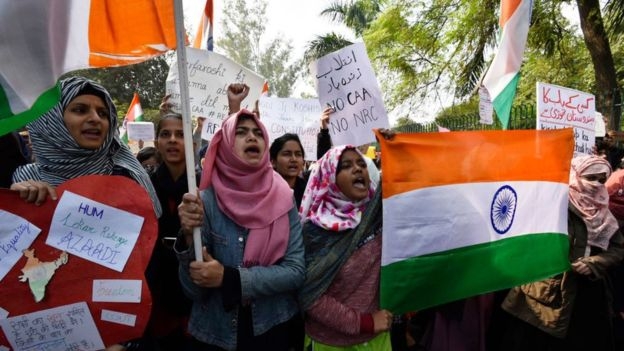Protests erupt across India over citizenship law
 Student protesters near Jamia Millia Islamia in Delhi
Student protesters near Jamia Millia Islamia in Delhi
Protests over a controversial new law on migrants are raging across several Indian cities, prompting police to clash with demonstrators.
The new law entitles non-Muslim migrants from three Muslim-majority countries to citizenship if they are facing religious persecution.
Police used tear gas and detained protesters in the capital Delhi as buses were torched and roads blocked.
Protests have raged across northern and eastern India since the law was passed.
Internet services have been shut down in several cities where protests are taking place. Universities across the country have resumed demonstrations on Monday.
A massive demonstration against the law has also begun in West Bengal state, led by Chief Minister Mamata Banerjee and her ruling Trinamool Congress party.
Tens of thousands of people are expected to participate.
Some critics say the law is anti-Muslim, while others - especially in border regions - fear large-scale migration.
Six people have been killed in the five days of unrest.
Several lawyers asked the Supreme Court to intervene, pointing out that officers had assaulted students in bathrooms, but the chief justice said that the court would not take any action until students ceased their protests.
The UK, US and Canada have issued travel warnings for people visiting India's north-east, telling their citizens to "exercise caution" if travelling to the region.
What is happening in Delhi?
On Monday morning, protests resumed in Delhi's prestigious Jamia Millia Islamia university after students held a march which ended in clashes with the police on Sunday.
Around 35 students were detained by police on Sunday and released early on Monday morning.
The university's vice chancellor, Najma Akhtar, condemned the police action on Monday and told reporters that they would be filing a court case against the police and demanding a high-level inquiry.
She also denied rumours of student deaths.
It is still unclear who started the violence but stones were thrown at the police who retaliated with tear gas.
Local media reported that nearly 60 people, including students and police, were injured. At least three buses and several motorcycles were set on fire.
Students distanced themselves from the violence and some police officers privately admitted that local troublemakers were behind the trouble, the BBC's Kinjal Pandya reported.
The university said police later entered the campus without permission and video footage showed police assaulting students and staff.
Videos shot by students show police beating up students inside campus areas like bathrooms and the library.
Police have said that they did what was "necessary" to stop the protests.
Some schools in southern Delhi have been asked to remain closed on Monday.
Hundreds of people also protested in other parts of the city, including in Jawaharlal Nehru University and outside the city's police headquarters.
What did the Supreme Court say?
"Public properties are being destroyed, buses are being burned. We will take cognisance, but all this has to stop," Chief Justice Sharad Bobde said.
He added that the court was not against peaceful demonstration, but that "this atmosphere must settle down".
"If protests and violence continues, we will not hear a case on this."
The chief justice also criticised the student protesters, saying that they could not "take the law into their own hands".
"The court can't do anything right now. Let the riots stop," he said.
Source: bbc.com/news
Trending World

Nobel officials unsure when Peace Prize winner will arrive for ceremony
00:18
A coup too far: Why Benin's rebel soldiers failed where others in the region succeeded
15:51
Burkina Faso accuses Nigerian Air Force of violating its airspace
15:48
Sudan militia chief sentenced to 20 years for war crimes during Darfur conflict
15:46
Tanzania crackdown on planned protest leaves streets deserted
15:44
Ukraine prepares new peace plan as Zelensky rules out giving up land
14:40
Elon Musk's X bans European Commission from making ads after €120m fine
11:41
US could ask foreign tourists for five-year social media history before entry
19:06
Benin coup plot leader hiding in Togo, official says
19:03
Nobel Peace Prize winner's daughter accepts award on her behalf
18:55




